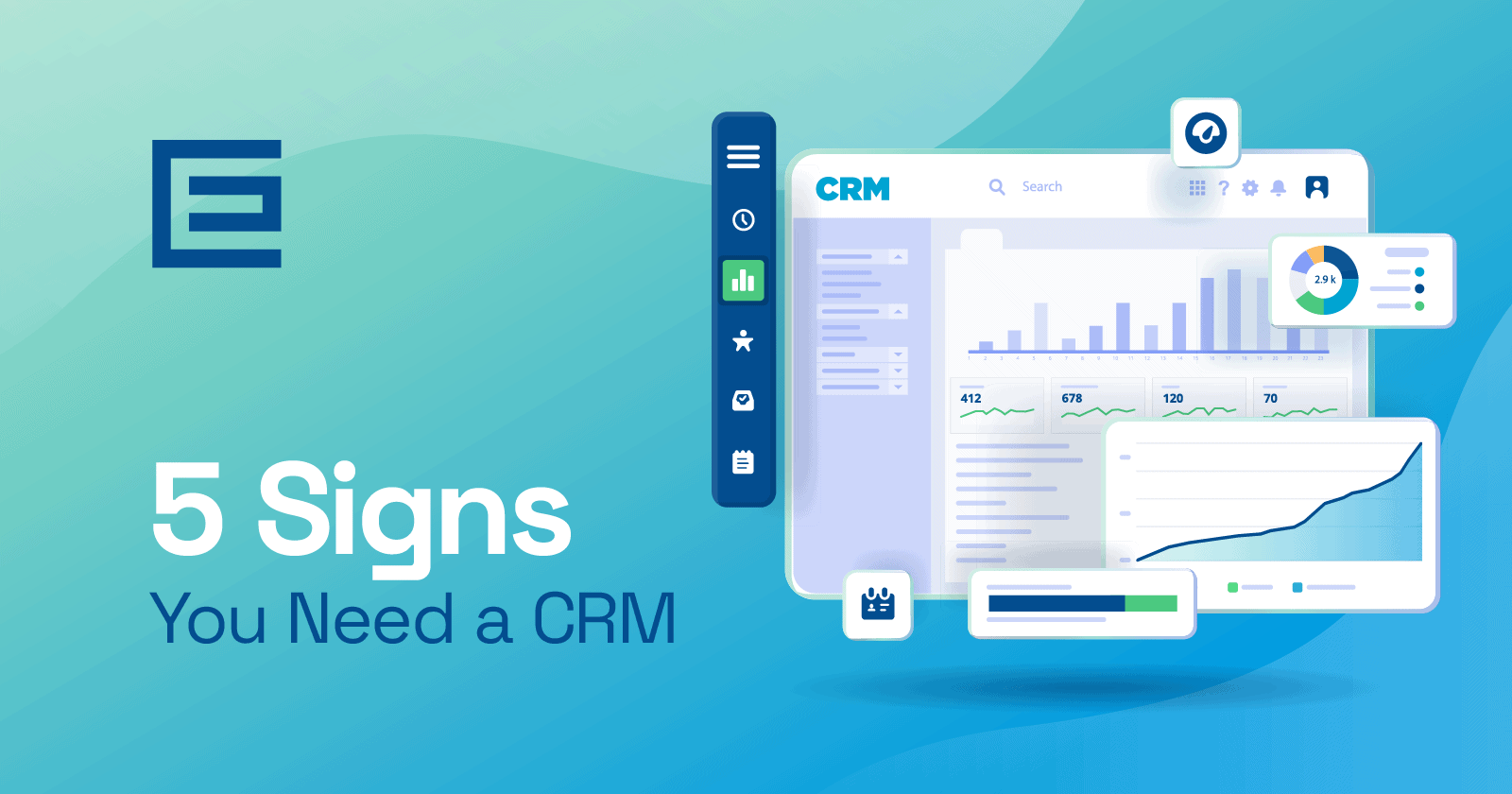Growing a business means maintaining seamless communication and efficient customer management. Yet, many businesses still rely on outdated methods to handle customer interactions, resulting in missed opportunities and decreased efficiency. Enter Customer Relationship Management (CRM) systems. A CRM can revolutionize how you manage customer relationships, making sure you and your teams never miss a beat.
Join our digital marketing experts from TheeDigital as we explore five clear signs that it’s time for your business to invest in a CRM.
What is a CRM System?
CRM systems are software tools designed to help businesses manage interactions with current and potential customers. These systems typically organize, automate, and synchronize sales, marketing, customer service, and technical support processes.Let’s explore the key features of CRM systems.
Centralized Customer Data
CRMs centralize customer information, including contact details, interactions, purchase history, and preferences, into a single database accessible to authorized users. This helps businesses gain a comprehensive view of each customer.
Sales Automation
CRMs automate various sales tasks such as lead generation, lead scoring, and sales forecasting. They can also track sales interactions and manage pipelines to optimize the sales process.
Marketing Automation
CRMs facilitate targeted marketing campaigns by segmenting customers based on demographics, behavior, or other criteria. They enable personalized digital marketing communications through email marketing, social media integration, and campaign management.
Customer Service Management
CRMs enhance customer service by providing tools for managing customer inquiries, complaints, and support tickets. They enable efficient resolution of issues and tracking of customer interactions across multiple channels.
Analytics and Reporting
CRMs offer analytics capabilities to track key metrics such as sales performance, customer satisfaction levels, and marketing campaign effectiveness. This data helps businesses make informed decisions and improve strategies.
Integration Capabilities
Many CRMs integrate with other business systems such as ERP (Enterprise Resource Planning) software, e-commerce platforms, and communication tools. This ensures seamless data flow and enhances overall operational efficiency.
Top Signs Your Business Needs a CRM

Recognizing when your business needs a CRM system is pivotal for sustaining growth and enhancing customer satisfaction. As businesses evolve, so do their needs for managing customer interactions efficiently.
#1 – Repeated Customer Outreach
In an ideal scenario, businesses would efficiently reach their customers with just one communication attempt. However, in reality, multiple contacts are often necessary, leading to potential frustrations and miscommunications for both parties.
How to Enhance Customer Communications with CRMs
CRM systems play a crucial role in managing multiple customer communications effectively. By centralizing interactions across various channels—whether through emails, phone calls, or social media platforms—CRMs ensure every touchpoint is recorded and easily accessible.
This capability not only prevents the repetition of messages but also enhances professionalism by providing a comprehensive view of past conversations. With a CRM, your team can streamline communication workflows, reduce redundancy, and maintain a consistent and organized approach to customer interactions.
#2 – Customer Problems Arise After Conversion
Even with the best intentions, businesses may face customer issues post-conversion. How these concerns are managed can greatly influence customer satisfaction and loyalty.
How to Manage Customer Issues with CRMs
A CRM system enables systematic tracking and resolution of customer issues. Each problem is documented, assigned to the appropriate team member, and monitored until resolved. This approach ensures that no issue is overlooked and allows your team to deliver prompt and effective support.
By capturing and analyzing these issues, CRMs help identify recurring problems, facilitating proactive process improvements to prevent future issues and enhance overall customer experience. By leveraging a CRM, businesses can proactively manage post-conversion challenges and foster stronger customer relationships.
#3 – Multiple Teams Need Client Communication Access
In a growing business, managing client information across multiple team members can be challenging. Changes in personnel, team collaboration dynamics, and absences can complicate matters if information isn’t readily accessible.
How to Streamline Communication with CRMs
A reliable CRM system integrates seamlessly with existing communication channels, consolidating all interactions into a centralized hub. This centralized approach allows team members to access comprehensive client communication histories efficiently, regardless of who initiated the interaction.
By logging all interactions in one place, CRMs save time, minimize errors, and ensure consistent and informed client management across the organization. This accessibility promotes collaboration, enhances efficiency, and strengthens client relationships by keeping everyone aligned and informed.
#4 – You Have an Interest in Measuring Client Data
Understanding client data is critical for refining business strategies. This data holds answers to pivotal questions such as customer acquisition sources, purchase timelines, and lead conversion rates.
How to Harness Client Data with CRMs
A CRM system offers robust analytics and reporting capabilities to analyze client data comprehensively. From tracking initial interactions to final transactions, CRMs provide insights into customer journeys, conversion rates across various lead types, and the effectiveness of communication channels.
By leveraging these data-driven insights, businesses can refine their strategies, optimize marketing efforts, and make informed decisions that drive sustainable growth. CRM analytics empower businesses to adapt proactively to market trends, enhance customer engagement, and ultimately, achieve their strategic objectives efficiently.
#5 – Searching for Business Scalability Solutions
Scaling a business goes beyond boosting sales—it necessitates streamlined systems capable of growing alongside your company. Manual processes and scattered data can create bottlenecks that impede progress.
How to Leverage CRM for Business Scalability
Implementing a CRM isn’t just beneficial—it’s essential for businesses of all sizes. Whether managing a handful of clients or expanding into a scalable enterprise, CRM functionalities empower entrepreneurs to effectively manage operations. By utilizing CRM capabilities, businesses can enhance communication efficiency, expedite issue resolution, foster seamless collaboration, analyze critical client data, and scale operations smoothly.
Investing in a CRM proactively equips businesses to tackle challenges before they escalate, ensuring sustained growth and success in today’s competitive landscape. Don’t wait for challenges to arise; integrate a CRM today and witness your business flourish.
Choosing the Best CRM System for Your Business Needs
Choosing the right CRM system is pivotal for businesses aiming to optimize operations and enhance customer relationships. There are several types of CRM systems, each designed to cater to different business needs:
- Operational CRM: Focuses on streamlining business processes such as sales automation, marketing automation, and customer service. It offers centralized customer data and improved efficiency in customer-facing operations.
- Analytical CRM: Emphasizes data analysis to gain insights into customer behavior and preferences. It helps businesses make informed decisions by providing valuable analytics and reporting tools.
- Collaborative CRM: Facilitates communication and collaboration across different departments within an organization. It enhances teamwork and ensures consistent customer interactions across various touchpoints.
- Campaign Management CRM: Specializes in managing marketing campaigns and tracking their effectiveness. It integrates with marketing automation tools to optimize lead generation and conversion rates.
Each type of CRM system offers unique benefits tailored to specific business needs and objectives. However, HubSpot’s CRM tool stands out as a comprehensive solution that combines the best features of operational, analytical, collaborative, and campaign management CRMs.
Why Choose HubSpot CRM?
HubSpot CRM integrates all essential functionalities into one unified platform. It empowers businesses to streamline operations, drive growth, and foster long-term customer relationships effectively.
With HubSpot’s features, businesses can:
- Consolidate customer information from various sources for a unified view.
- Automate communication channels and ensure consistent messaging.
- Manage sales pipelines, prioritize leads, and accelerate deal closures.
- Align marketing efforts with sales goals through integrated campaigns.
- Gain valuable insights through advanced analytics and reporting.
- Scale operations effortlessly as business needs evolve.
Getting Started with Hubspot
Embarking on your journey with HubSpot CRM marks a pivotal step towards enhancing your business operations and customer relationships. Whether you’re new to CRM systems or transitioning from another platform, this guide will help you harness the power of HubSpot effectively.
Here are the steps to streamlining your business operations with HubSpot.
1. Setting Up Your HubSpot Account
Getting started with HubSpot is straightforward and begins with setting up your account. Visit the HubSpot website and sign up for an account. Choose the plan that best suits your business needs. Complete the initial setup by entering your business information and configuring basic settings such as user permissions and integration preferences.
2. Importing and Organizing Your Data
Once your account is set up, it’s time to import and organize your data within HubSpot:
- Data Import: Import your existing customer data into HubSpot, including contacts, companies, deals, and any other relevant information.
- Data Organization: Use HubSpot’s tools to categorize and organize your data effectively. Create custom properties and lists to segment your contacts based on criteria that matter to your business.
3. Customizing Your CRM Setup
Customize your HubSpot CRM to align with your business processes and goals:
- Custom Fields and Workflows: Configure custom fields to capture specific information unique to your business. Set up workflows to automate tasks and streamline processes.
- Integration Setup: Integrate HubSpot CRM with other business tools and platforms you use daily, such as email marketing software, social media platforms, and customer support tools.
4. Training and Onboarding Your Team
Ensure your team is equipped to leverage HubSpot effectively. Schedule training sessions to familiarize your team with HubSpot’s features and functionalities. Utilize HubSpot’s resources, tutorials, and support options to onboard your team smoothly and address any questions or challenges.
Partner with HubSpot Marketing Professionals
Implementing HubSpot effectively requires strategic guidance and expertise. At TheeDigital, our team specializes in maximizing HubSpot’s capabilities to drive business growth. From initial setup and data migration to customized CRM configurations and ongoing support, we tailor solutions to meet your specific needs.
Here’s why you should leave HubSpot CRM management to the pros:
- Expert Guidance: Benefit from expert advice and strategic guidance tailored to your business needs.
- Efficient Implementation: Ensure seamless setup and integration of HubSpot CRM into your existing workflows.
- Customized Solutions: Receive customized solutions and configurations that align with your business goals.
- Ongoing Support: Access ongoing support and troubleshooting to maximize CRM efficiency and effectiveness.
- Focus on Core Business: Free up time to focus on core business activities while professionals handle your CRM management.
Harness the Power of HubSpot’s CRM System Today with Our Experts
Ready to harness the full potential of HubSpot’s CRM system for your business? Partner with TheeDigital’s expert team of HubSpot marketing professionals today and elevate your operations to new heights.
Whether you’re looking to streamline customer relationship management, optimize sales pipelines, or integrate marketing automation seamlessly, our team is here to help. With a proven track record in SEO and digital marketing services to businesses nationwide, we specialize in tailoring solutions to meet your unique business needs.
Implement Your CRM Today
Need help implementing these digital marketing trends into your strategy? Contact us now to schedule a consultation and discover how we can empower your business with HubSpot CRM. Get started today by calling us at 919-341-8901 or filling out our contact forms. Also get in touch by scheduling a consultation.
FAQs
A CRM centralizes all customer interactions, making it easy to track and manage communications across multiple channels. This ensures consistency and prevents redundant messages, enhancing the customer experience.
Yes, a CRM allows you to log, track, and resolve customer issues efficiently. It ensures that every problem is addressed promptly and effectively, improving customer satisfaction and loyalty.
A CRM can analyze various types of client and website data, including the customer journey, conversion rates, lead sources, and communication effectiveness. This helps you refine your business strategies and improve performance. Todays top CRMs can integrate with Quickbooks, GA4, call tracking software like CallRail, and Google Ads.
Absolutely. A CRM is beneficial for businesses of all sizes. It helps small businesses manage customer relationships more effectively, streamline operations, and prepare for growth.
A CRM provides a central repository for all client communications and data, making it accessible to all team members. This promotes collaboration, reduces errors, and ensures everyone has the information they need.
Yes, a CRM is designed to handle increasing volumes of data and interactions. It automates processes and workflows, removing bottlenecks and allowing your business to scale smoothly and efficiently.
Tags: Digital Marketing • HubSpot • Our Favorites








